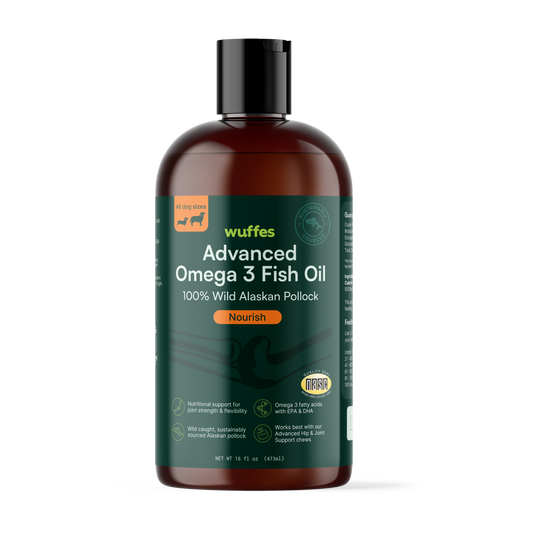Arthritis is one of the most common medical conditions in dogs, causing progressive pain and mobility issues as animals age*. Arthritis in dogs has a variety of causes, such as the abnormal development of bones, injuries, and excessive forces placed on joints. The progression of arthritis is complex, with inflammation, reactive oxygen species (oxidative damage), excessive cartilage breakdown, and reduced ability for cartilage healing, all playing a role.
Unfortunately, there is no cure for arthritis. It is up to pet owners and veterinarians to create a treatment plan to help slow arthritis progression and reduce the pain and mobility issues that it causes in pets. Joint supplements play an important role by providing nutrients that can support the structural integrity and body’s repair of joints, enhance healthy joint fluid viscosity and help maintain a normal inflammatory response. While some of these nutrients can be found in high-quality dog foods, the dose of nutrients in food may not be high enough to maximize the benefit of the nutrient for arthritis management.
How to choose a joint supplement
To assess the quality of a joint supplement you and your veterinarian can look for labels on supplements, such as the Good Manufacturing Practice (GMP) Certification or the National Animal Supplement Council (NASC) seal. You can also look at supplement websites to see if each batch of manufactured supplement is tested for nutrient content, and/or if an independent laboratory also tests the supplement. These additional measures help guarantee that the supplement is made safely and contains the nutrients your pet needs.
There are many nutrients, or active ingredients, that can benefit dogs with arthritis. When choosing a supplement, it is important to think about if your dog is at risk for arthritis and you are providing proactive care, or if your dog is currently showing discomfort due to arthritis, and you are providing active care.
Proactive care before discomfort
The Goal of supplementation is to support joint health and maintain a normal inflammatory response.
Many dogs can benefit from joint supplements before they show signs of arthritis, especially if they are at-risk for developing arthritis. Below are some reasons your dog may be at risk for developing arthritis:
- Diagnosed with elbow or hip dysplasia
- Prior orthopedic injury (eg: bone fracture, torn ligament, tendon or muscle)
- Active lifestyle (eg: sporting or working dog)
- Overweight
- Other medical issues (eg: muscle atrophy, Cushing’s Disease, neurologic weakness)
Active ingredients that especially benefit dogs who are at-risk for arthritis include those that help support cartilage health and maintain a normal inflammatory response in the joint. For instance, omega-3 fatty acids benefit dogs with joint issues by reducing inflammation associated with normal daily exercise and activity**. Undenatured type II collagen (UC-II®) also supports joint health by reducing the inflammatory response in joints***. Glucosamine and chondroitin are components of joint cartilage, which in humans when supplemented in high daily doses have been shown to slow cartilage loss over years of treatment***. Similar studies evaluating the long-term effects of glucosamine and chondroitin on cartilage breakdown have not been completed in dogs.
Active care when your dog is showing signs of discomfort
Goal of supplementation is to ease discomfort and decrease inflammation
Once your dog is showing signs of joint issues, you want to choose active ingredients to help ease occasional discomfort and promote healthy inflammatory pathways. For instance, omega-3 fatty acids (eg: fish oil, green-lipped mussel) and undenatured type II collagen (UC-II®) help ease discomfort in dogs by decreasing inflammation, and modifying the inflammatory response, respectively.*** Whereas, cannabidiol (CBD) eases discomfort in dogs both by reducing the sensation of discomfort and by modifying the inflammatory response**.
How your Veterinarian can help
Importantly, there are other medical conditions that can cause similar painful signs in dogs. Thus, consultation with a veterinarian to confirm that your dog has arthritis is recommended. Once confirmed, veterinarians can help you choose a supplement that is high quality, has the right nutrients to benefit your pet, and the optimal dose of active ingredients for your pet. Veterinarians can also recommend complimentary treatments for your pet, such as specific exercises, diet recommendations, medications, and/or other beneficial therapies (such as laser therapy or joint injections). For instance, a very important part of arthritis management is keeping your pet at an ideal weight, even reducing body weight by 6% (or about 2 lbs for a Labrador Retriever) can significantly improve joint comfort.***
References
*Forsyth KK, McCoy BM, Schmid SM, et al. Lifetime prevalence of owner-reported medical conditions in the 25 most common dog breeds in the Dog Aging Project pack. Front Vet Sci. 2023;10:1140417. Published 2023 Nov 3. doi:10.3389/fvets.2023.1140417
**Barbeau-Grégoire M, Otis C, Cournoyer A, Moreau M, Lussier B, Troncy E. A 2022 Systematic Review and Meta-Analysis of Enriched Therapeutic Diets and Nutraceuticals in Canine and Feline Osteoarthritis. Int J Mol Sci. 2022;23(18):10384. Published 2022 Sep 8. doi:10.3390/ijms231810384
***Ratsch BE, Levine D, Wakshlag JJ. Clinical Guide to Obesity and Nonherbal Nutraceuticals in Canine Orthopedic Conditions. Vet Clin North Am Small Anim Pract. 2022;52(4):939-958. doi:10.1016/j.cvsm.2022.03.002













